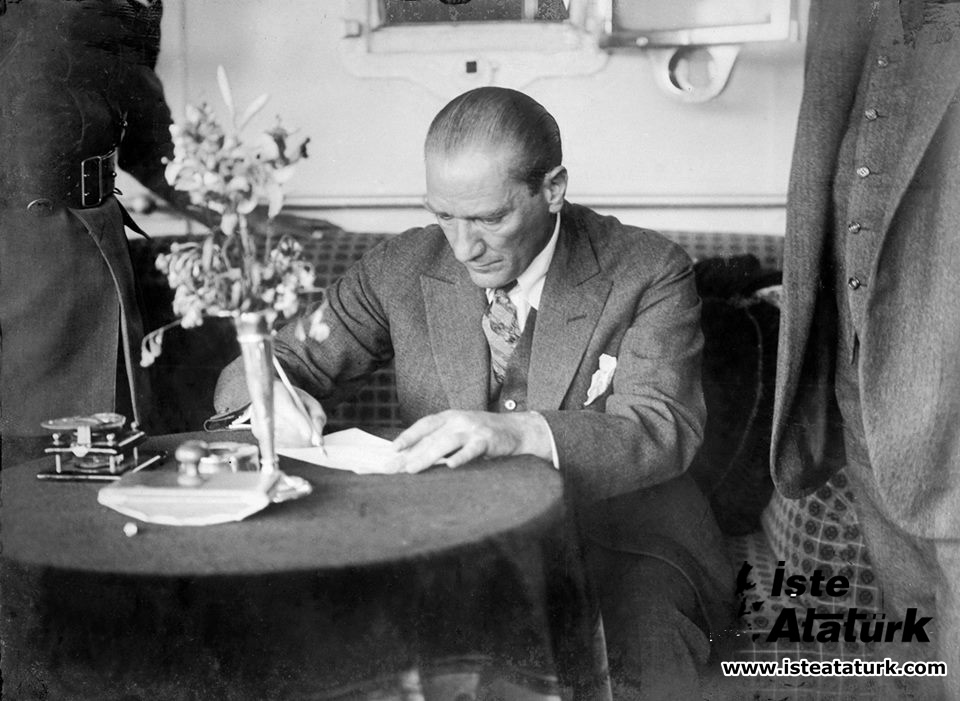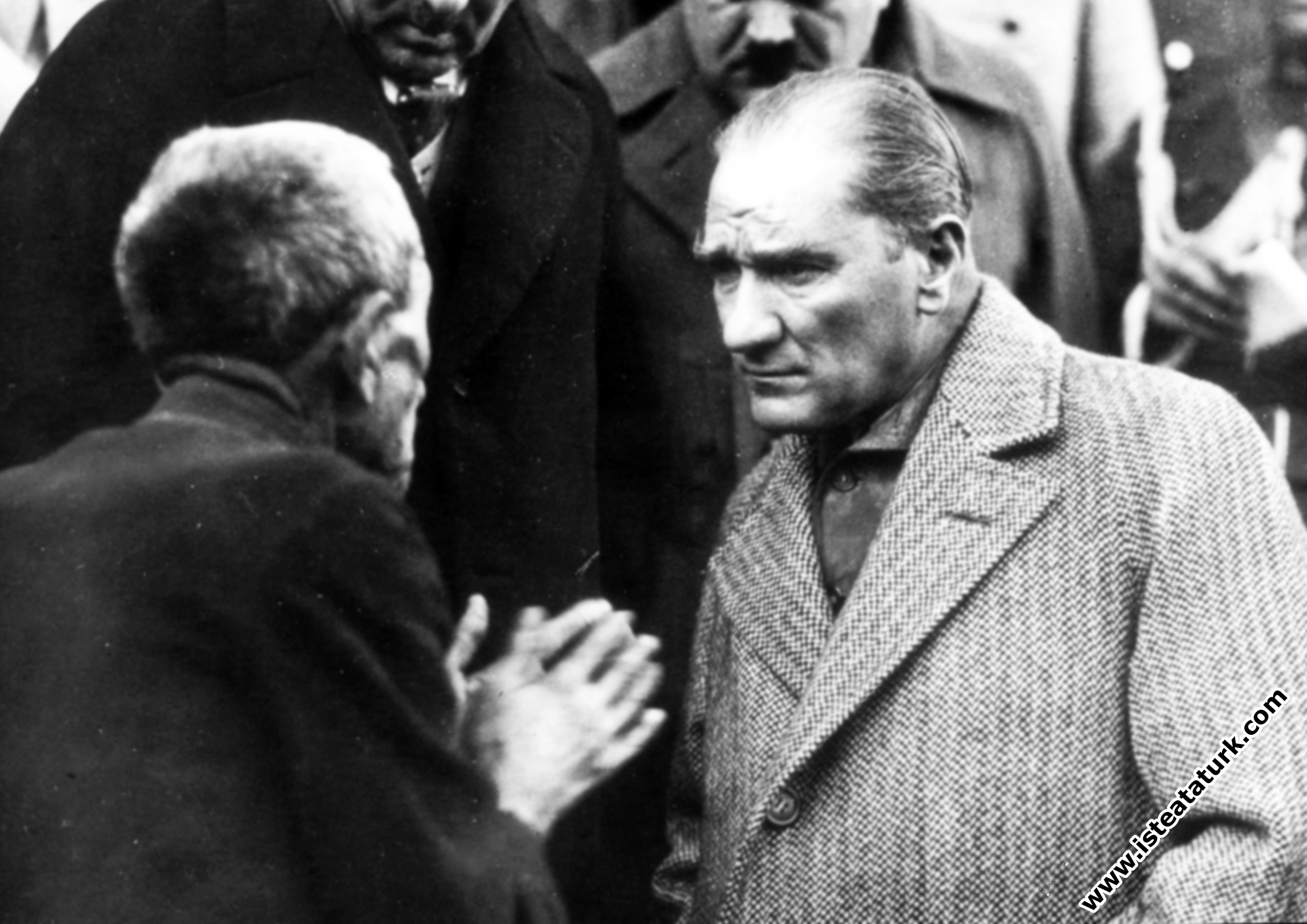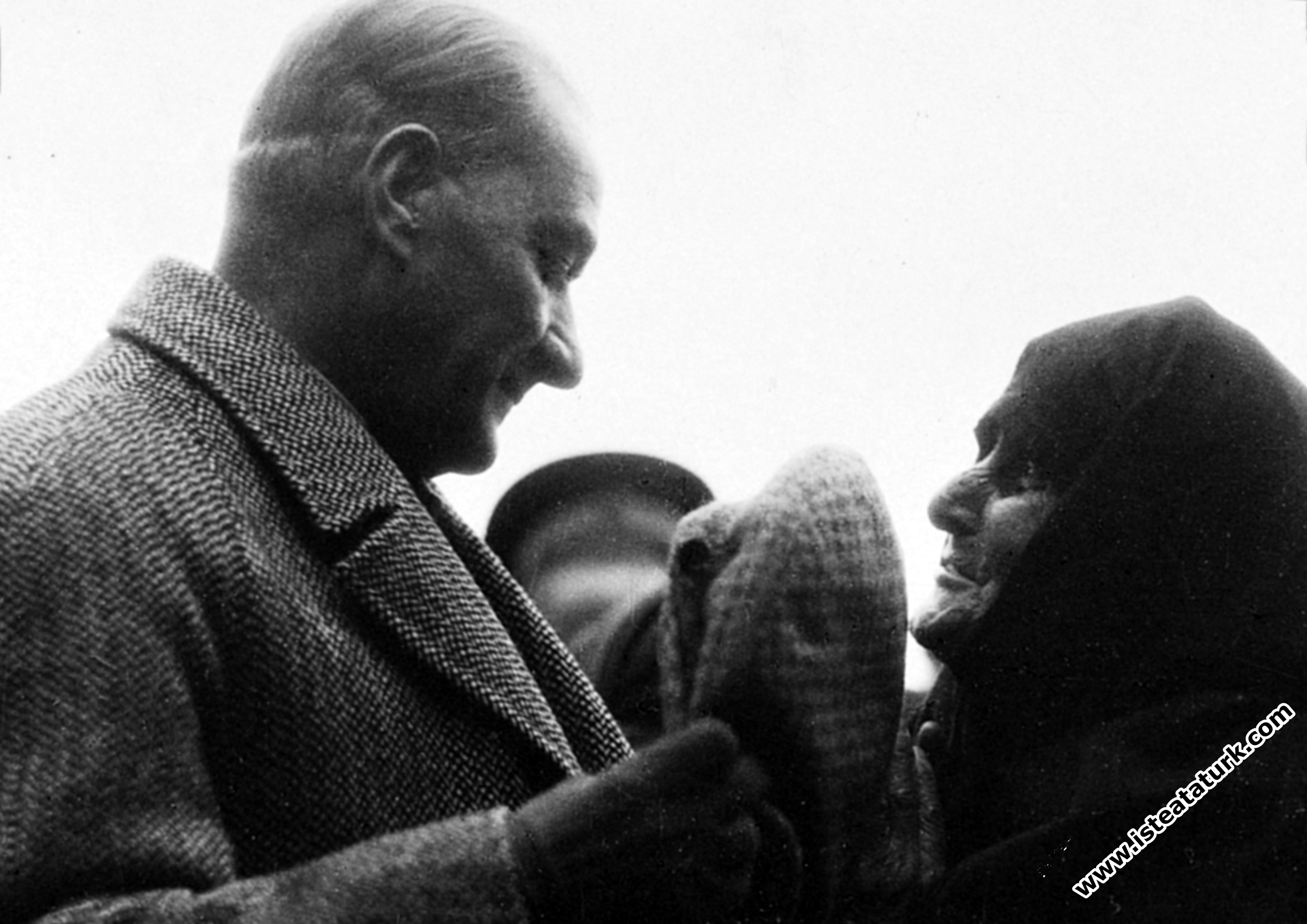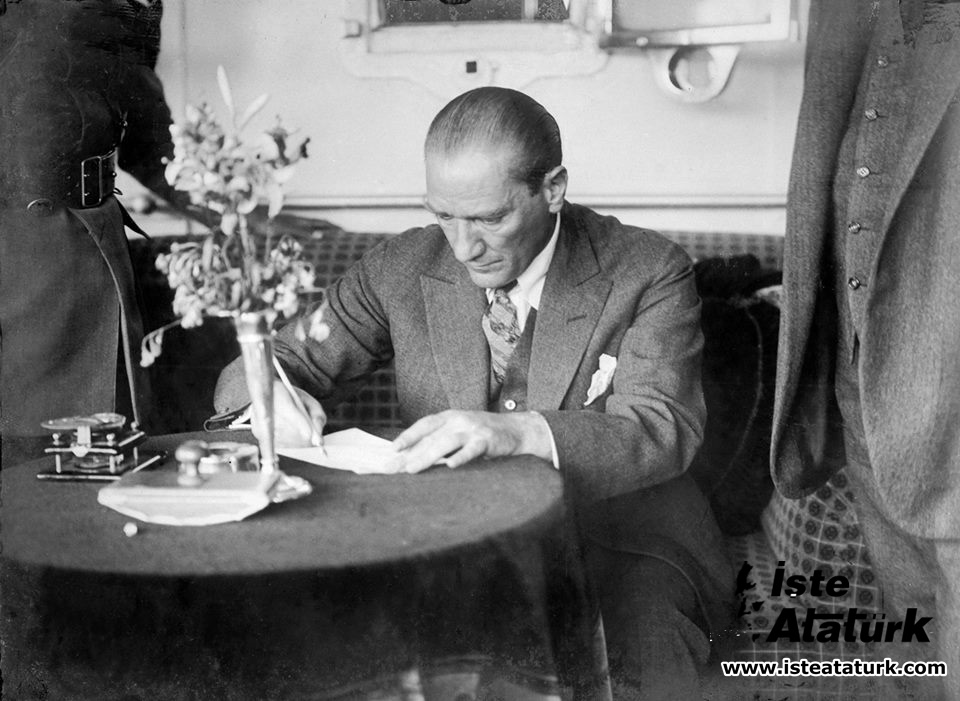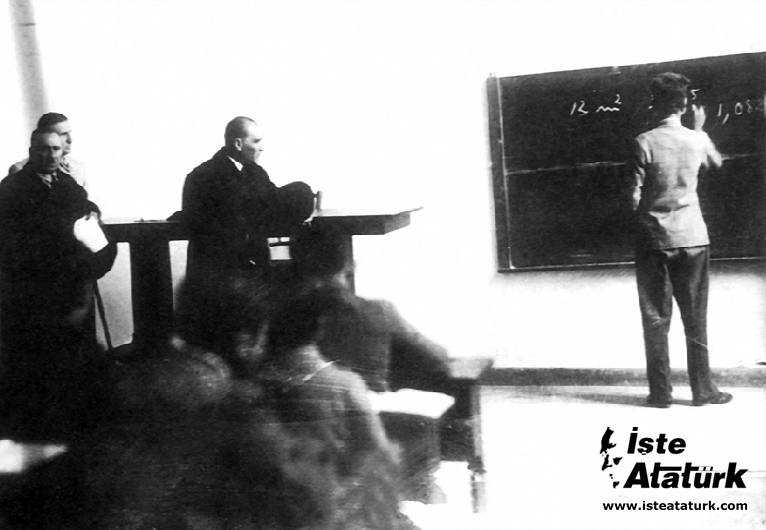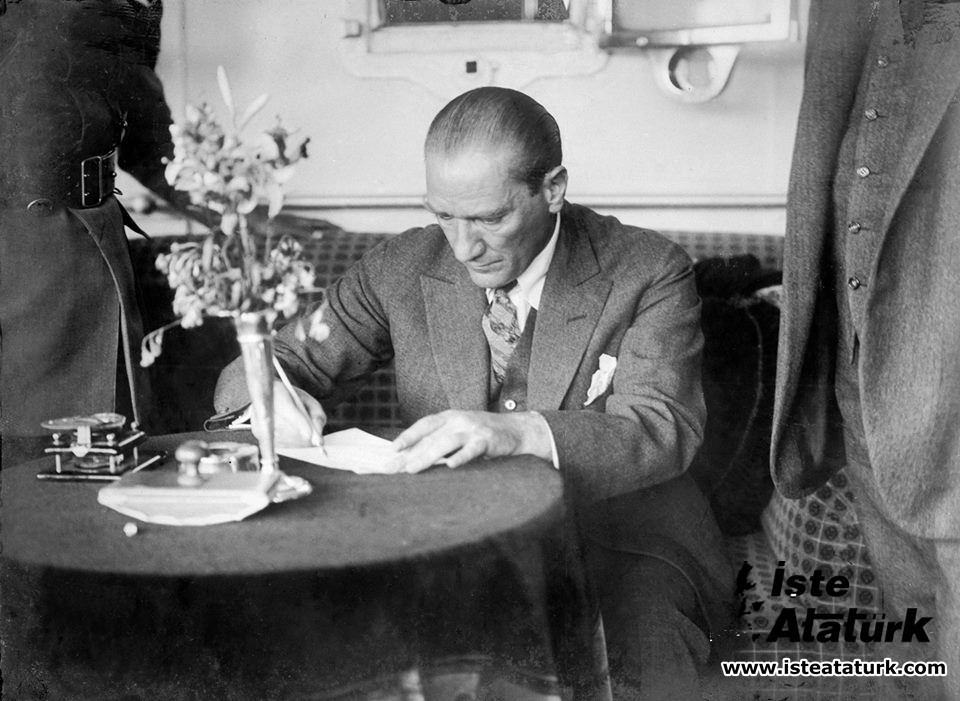
Realistic Atatürk
Character Size
“... We do not deign to gain temporary favors by deceiving the people about matters that we do not understand, and that we do not see ourselves as capable and capable of doing. We hate to make false promises to the nation, like vulgar politicians." Mustafa Kemal Atatürk
REALISTIC ATATURK
I. INTRODUCTION
The Great Leader of the Turkish War of Independence, the first successful national independence movement of our age, Gazi Mustafa Kemal Pasha (Atatürk), is undoubtedly a great national and universal leader. I am glad that you are not alone in this assessment. Because; Many authorities share this view. For example; The well-known British historian Lord Kinross expresses his opinion about Atatürk with the following definite expression: “... I have no doubt that Kemal Atatürk is one of the greatest men of our time..?”1. Known for his studies on Turkey and Atatürk, the American scientist Prof. Dr. Dankwart Rustow, on the other hand, defines Atatürk's greatness as follows: “... Kemal's role in the transformation of the Ottoman Empire into the Turkish Republic is of the kind often referred to as charismatic, in a Weberian (Max Weber) term. A charismatic leader
The natural conclusion revealed by the above evaluations is that Kemal Atatürk was a highly qualified leader. Because; Leadership, in its widest scope, is the art of leading and managing societies.
There are many qualities in different numbers and characteristics that symbolize the leaders in the world literature. Thanks to these qualities, including "Realism", leaders are able to use the concepts and rules known as "Leadership Principles" appropriately and in a timely manner.
In his multi-faceted historical personality, first of all, as a professionally trained soldier, Atatürk understood the Art of Military Service and the most important element of it, the Principles of War, and knew how to apply it on time and on time, a high strategy, a master tactician, manpower and He is an outstanding commander who has proven to be a great organizer in logistics issues, more specifically a "military genius" leader. To emphasize this view, I would like to give at least two examples. We see the following remarkable lines in an Australian author's book, Gallipoli, regarding the Battles of Çanakkale (1915) in the First World War (1914-1918): “... event. Because; At the time of the first landing (the morning of April 25, 1915), a genius young commander (Mustafa Kemal) was present in the region. If it were not for this commander, the Australians and New Zealanders (ANZAC Corps) might well have captured Chunuk Bair that morning and determined the fate of the Dardanelles Campaign at that time and place…”3.
Atatürk is one of the rare leaders who can transform his military genius into a political genius in a short time. Lord Kinross expresses this fact as follows: “... Atatürk was a great soldier above all else; However, in time he became a great statesman. Besides the many great soldiers and great men that history tells us, there are very few people who combine these two characteristics and Atatürk is one of these rare people. He is a great soldier-statesman. Atatürk, on the one hand, is a man of war; On the other hand, he is a man of peace. The great military genius in him saved his nation from collapse, and again, the statesman character in him provided the rebirth of his nation, whose life he radiated..."4. In this regard, I think, the most authoritative authority is the late İsmet İnönü, Atatürk's closest friend in arms and revolution. According to İsmet İnönü, himself an outstanding soldier and statesman, “. .. (Atatürk) has great qualities. He is a decision maker, his decisions are clear, and once he has made a decision, his personality is very impressive to enforce it... This is one of the greatest qualities for a commander. His military qualifications are really high. He is regarded as a high-qualified commander in every nation and in every era... (But) his political qualifications are seen to be greater. When these two come together, Atatürk's personality has risen to an exceptional level...”5.
At the end of this introductory part; I would like to take advantage of a passage that may shed light on the main part of my article: “... This great success is the result of combinations of talents that are rare in humans. Atatürk was a patriot devoted to his nation with deep love. It was constructive, full of energy. He could quickly pull himself together in the face of events. He had an indomitable will and strength of resilience. He was a man who could integrate intuition and logic in his mind with a rare talent, an idealist who wanted to reform his country and the way of life of his people. Of all these upbuilding and life-giving qualities, one is to be found in Churchill and the few who grew up in that age. This is "realism". Atatürk's achievements in the practical field should be attributed to his realism... Realist Mustafa Kemal, who was raised in an age far from realism,
II. ATATURK'S REALISM
Famous German poet and writer Johann Wolfgang von Goethe. “... The first and last thing necessary for genius is love for the truth...” he says. This definition of poet undoubtedly includes Atatürk as well. Because; Atatürk is a genius and is so passionate about the truth that he says, "The truth should be accepted as it is, no matter how bitter it is".
The biggest factor in Atatürk's realism is undoubtedly that reason, science and common sense always lead all his thoughts and behaviors. Because; According to Atatürk, "There is no problem that reason and logic cannot solve" and "the truest guide in life is science". I prefer to indicate Atatürk's common sense with an example. We see the following story in the book Çankaya by Falih Rıfkı Atay, one of the well-known writers of the Atatürk Age: In the early 1920s, Atatürk often visited İzmir. The famous dinner table is organized with the exchange of ideas. The table is in a room where passers-by can see it. The people passing by, of course, are interested and start watching with curiosity. Thereupon, the Governor orders the curtains to be closed. Ataturk, He intervenes in this situation and says: “Governor, what do the people outside think we are doing? No doubt we were drinking. But; Now, they're going to think we're playing the woman, and who knows what else we've been doing. Have them open the curtains so they can see that we are doing nothing but drinking”.
Atatürk, throughout his life, remained true to the facts; he saw them as they were, not as his mind imagined or his heart desired. At a time when everything seemed to have disappeared, in the depressed environment that immediately followed World War I, his attempt to engage in the Turkish War of Independence is based on his realism, which others cannot discern, not imagination. Atatürk, some writers "my cousin Mustafa, are you crazy?" In that depressive period, when he underestimated himself to say that, he was evaluating the public opinion, not the governments of the Great Powers, who were frightened even by their shadows, and he sensed that those war-weary masses would not move unless it was a vitally important situation for them. What makes Atatürk exceptional is this power of intuition, this farsightedness.
Yes, Atatürk was a true realist. However, I should point out right away: He is never intimidated by negative facts; on the contrary, his will would be more sharpened and he would take the most appropriate and determined attitude towards finding a solution to the real situation. I find it useful to illuminate this important point with an example. In 1921, which constituted the "Resistance (attrition) Phase" in our War of Independence, the Turkish Western Front Forces had to withdraw to the east of Eskişehir during the Kütahya-Eskişehir Battles that took place on 8-23 July. Upon this critical situation, Mustafa Kemal Pasha, the President of the Turkish Grand National Assembly, who came to the battlefield on 19 July 1921, gave the order to withdraw the army to the back of the Sakarya River after closely examining the situation. This is indeed a bold decision. Because; mainly the defeat of Kütahya-Eskişehir Battles and Kütahya, The loss of important settlement centers such as Afyon and Eskişehir has shaken the morale of the country. Now, in the eastern part of Eskişehir, 100-150 km to the Sakarya section. By withdrawing, another large piece of land was left deliberately to the enemy. As a natural consequence of this, the morale of the army and the people could be further deteriorated. But; Mustafa Kemal Pasha, who had a realistic character as well as his physical and spiritual courage, said "... let's follow the requirements of military service..." and made this bold decision. In fact, this decision was based on the sound judgment of a realistic and farsighted commander, a leader whose military genius was proven by examples. Our ancestor's assessment of this situation, I am sure, constitutes a unique example in our military history. Thus,
Atatürk, who does not lose his calm and restraint in adverse situations, is not a leader who will lose his personal control during the victory: because his realism prevents him from getting away from common sense by getting too enthusiastic. I would like to emphasize this point with an example. Mustafa Kemal Pasha, who ended the August 30 Battle of the Commander-in-Chief with victory in 1922, which was the "Definitive Phase" of our War of Independence, did not engage in a serious conflict with the Turkish Army, which was holding the Dardanelles Strait section, during the follow-up operation (August 31-September 18). He could have taken a tougher stance by risking a collision with the British Forces, who did not seem willing but did not hesitate to try to salvage the situation. He didn't. He simply showed his strength by continuing to move forward in the direction of the straits, and when he saw the first tendency to compromise, stopped their armies. Because; He had won the real war, the Turkish War of Independence. Its purpose is no longer to pursue new wars; was to win peace, “the peace that will provide civilization, development and modernization to the country”, and he won... In this attitude of Atatürk, a realistic and deterrent strategy and the dominant personality of the statesman stand out. We can clearly see this dominant personality in the following evaluation of the well-known British historian Bernard Lewis. “... (with the Treaty of Lausanne) Turkey, as the only one among the defeated states of the First World War, managed to rise from its own desolation and by rejecting the peace dictated to it by the victors, it achieved the acceptance of its own terms.... The military war was won. The political program of the Nationalists was accomplished and accepted by an international treaty. What should he do next? Mustafa Kemal, He showed his true greatness in his answer to this question. This point is well stated in a comparison between Mustafa Kemal and Enver Pasha by Turkish journalist Falih Rıfkı Atay: “Enver's quality was audacity, Mustafa Kemal's quality was far-sightedness. If Mustafa Kemal had been the Minister of War in 1914, he would not have brought the State into World War I. If Enver Pasha had entered Izmir in 1922, he would have turned quickly, marched on Syria and Iraq, and lost what he had won”. Seriously, then, there were many attractive things that could seduce a war hero... In 1923, during his victory, there were many opportunities that could prompt a commander to seek greater glory or awaken new ambitions in a nationalist leader. He denied all of this, and the realism rarely seen among the protagonists,
Regarding Atatürk's realism, another British writer holds similar views. According to journalist-author David Hotham, who had the opportunity to get to know us very well by living among us for more than eight years in our country; “... All nations have great men; but. I doubt that a being similar to Atatürk's unique personality exists anywhere else. He is the eternal Leader... Mustafa Kemal was a giant who intervened in the turbulent environment of the end of World War I at the right time, and literally changed Turkey's destiny... He turned military defeat into victory, restoring independence and pride to his demoralized and fragmented country. . He was basically a successful commander. All his later attempts were successful. Because; The entire army was behind him. (Atatürk) made no attempt to invade territory or attack other countries. After determining Turkey's new borders, including Istanbul and the Straits, he was content with that. In this respect, he was an unattainable realist…”9.
Atatürk has never been a dreamer, never chasing dreams. With this; he would consider every possibility in his assessments of the situation in order to arrive at sound decisions; This requires imaginary wealth.
Our Ata is passionate about the “facts of life”; his words prove this “... We have taken our inspiration directly from life, not from the sky and the unseen. It is the conclusions we draw from the country we live in, the Turkish nation from which we have emerged, and the leaves of the history of nations that have recorded a thousand and one disasters and sufferings that chart our path...”10. With this; Here, I must make a point. Atatürk is an idealist as well as a realist. He believes in the existence of values for which even life can be sacrificed. It is from this belief that he embarked on our War of Independence, which brought our nation to sovereignty and independence. At the core of his idealism are civil courage and self-sacrifice. I would like to emphasize this point with an example. The year is 1919, Atatürk (as Mustafa Kemal Pasha) is in Sivas. After the end of the Sivas Congress (4-11 September), On September 20, an American delegation arrives in the city; the head of the delegation is Major General James G. Harbord, known as a veteran soldier; Harbord, the head of the delegation tasked by US President Woodraw Wilson to “examine the situation in Eastern Anatolia and the Armenian Question”, meets with Mustafa Kemal Pasha on the same day (September 20): “... Kemal was unwell with malaria and looked tired. But; Speaking with ease and comfort during a two-and-a-half hour conversation, he put forward his thoughts in a logical order... Harbord said, 'What do you intend to do now?' asked. During their speech; Mustafa Kemal was playing with a rosary he turned between his thin fingers. At this moment, with a nervous gesture, he had torn the string of the rosary. The grains fell to the ground and scattered. Kemal collected the grains one by one and said that this was the answer to the General's question. Like this; He expressed his desire to bring together the scattered parts of the country, to cleanse it from various enemies, and to create an independent and civilized state. Harbord said that 'this kind of hope fits neither logic nor military realities'. 'We know that some people took their own lives. Now, will we witness the suicide of a nation?' 'What you say is true, General,' said Mustafa Kemal. 'What we want to do in the current situation cannot be explained either in terms of the military or in any other way. But; despite everything, we will do this in order to save our country, to establish a free and civilized Turkish state, to live like a human being.' He placed his hand on the table, palm facing upward. 'If we fail,' he continued, 'rather than a bird would fall into the hand of the enemy and endure a heavy and dishonorable death, he was slowly closing his fingers as he spoke. As children of our ancestors, we would rather die fighting'. In front of him, his fist was completely closed. Mustafa Kemal's determination and resilience had impressed Harbord. “I had taken everything into account, but not this,” he said. We would have done the same if we had been in your shoes.”11.
Atatürk made the rule of "a balanced harmony between the purpose and the tool" valid in his political life and revealed that he was a complete realist in both his domestic and foreign policy. In this respect, he criticizes the Ottoman administration and states that "... they had to regulate their domestic policies according to their foreign policies" and "however, the truth should be the opposite; that is, foreign policy should be carried out to the extent that domestic politics can withstand...”.
Atatürk's emphasis on realism is clearly reflected in his words: “... We do not deign to gain temporary favor by deceiving the nation about matters that we do not understand and that we do not see ourselves as capable and capable of doing. We hate to make false promises to the nation, like vulgar politicians”12.
In Atatürk's Realism, "self-criticism" is remarkable. I would like to give an example in this regard. Modernization and the socio-economic development efforts, which are the absolute necessity of this, are Atatürk's great passions. He continued his work in this field without stopping, and he constantly directed, encouraged, supported and, if necessary, forced his colleagues. In the meantime, he took frequent trips to the country in order to closely monitor the flow of reform movements on the way to realizing the Turkish Revolution. According to an example found in the Secret Minutes of the Grand National Assembly; On a trip to the country in 1930, in his own words, “... Upon his return to the warm and comfortable seats of the Çankaya Mansion”, Atatürk tells the following story to those around him: “... When we were students at the Harbiye (Harp Academy), the school's stoves were not lit. . We'd be shivering all winter. Finally, one day, friends, they chose me (and a couple of friends) to go up to the Director. The manager was a palace man named Zülüflü İsmail Pasha. We got permission, we went to peace; We offered our prayers first to the Sultan and then to the Director. Finally, we came to the purpose: We wanted to tell the issue. But (what is possible!), the manager roared from the very first sentences, 'how cold I am ungrateful. May the sultan's blessing be on your knees; don't you see? How the stoves are burning loudly. Get out of here!' Indeed, the Director's stoves were roaring. The manager was sweating profusely; He was feeling very warm because of the heat, and he thought that the stoves of the whole school burned like this… Guys, we sometimes deceive ourselves in this Çankaya mansion, like this Zülüflü İsmail Pasha.” It is seen that; Atatürk is a realist, even a civilized realist who does not shy away from self-criticism by exceeding classical standards. From this perspective, Of course, it's even higher. With this; I must make one point clear here. Atatürk, by just seeing or sensing the facts; or, if necessary, self-criticism; By examining the events in depth and understanding all aspects, he would notify the responsible people about the measures to eliminate the problems he saw and prevent possible disorders, and control the implementation and results of these measures or have them made. In this respect, he was a complete "pragmatist", in other words, a "man of remedy and conclusion". would control the implementation and results of these measures or have them made. In this respect, he was a complete "pragmatist", in other words, a "man of remedy and conclusion". would control the implementation and results of these measures or have them made. In this respect, he was a complete "pragmatist", in other words, a "man of remedy and conclusion".
III. CONCLUSION
In conclusion, I can say; There is an "Atatürk Truth" that exalts our nation with its multi-faceted historical personality, principles that shed light on our national life, and the Turkish Revolution he created. This fact, in the words adopted by the United Nations Organization, constitutes “... a symbol of honor for the entire human world...”13.
The contribution of “Atatürk's Realism” with its intellectual and operational quality to the structure of Atatürk's Truth is great. While the Great Leader Atatürk defines himself with this realistic side, he puts him aside by saying "There are two Mustafa Kemals: One is me, flesh and bone, temporary Mustafa Kemal..." and continues immediately; “The other Mustafa Kemal, I cannot express him with the word I, He is not me, he is us. It is an intellectual and warrior community that strives for a new idea, new life and great ideal in every corner of the country. I'm representing their dreams. My attempts are to satisfy what they crave. That Mustafa Kemal is you, all of you. He is Mustafa Kemal who is not temporary, who must live and succeed.”14.
1 Lord Kinross, Realist Atatürk, The British Council, Ankara, 1981, p. 8.
2 Dankwart A. Rustow, Atatürk as Founder of a State, p. 208
3 Alan Moorehead, Gallipoli, Hong Kong. 1975, p. 97.
4 Lord Kinross, Realistic Atatürk, The British Council, Ankara, 1981, p. 8.
5 Abdi İpekçi, İnönü Talks About Atatürk, İstanbul, 1968, p. 35.
6 Lord Kinross, Realistic Atatürk, The British Council, 1981, p. 11th.
7 Tryon Edwards D.D., The New Dictionary of Thoughts, U.S.A., 1957, p. 230. 1988, s. 254-255.
8 Bernard Lewis, (The Rebirth of Turkey), translation: The Birth of Modern Turkey. Ankara,
9 David Hotham, The Turks, London, 1978. p. 23, 61.
10 Utkan Kocatürk's Ideas and Thoughts, 1984, p. 189-190.
11 Lord Kinross, (translation) Atatürk-The Rebirth of a Nation, 1972, p. 297-298.
12 Utkan Kocaturk, Ataturk's Ideas and Thoughts, 1984, p. 235.
13 Turkish National Commission for UNESCO, Atatürk, 1963, p. 215.
14 Utkan Kocatürk, Atatürk's Ideas and Thoughts, 1984, p. 342.
Retired Lieutenant General Cemal Enginsoy
Source: ATATÜRK ARAŞTIRMA MERKEZİ DERGİSİ, Sayı 27, Cilt: IX, Temmuz-Kasım 1993
